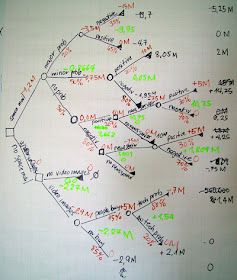 A reporter recently sent out an open call for input for an article he was writing about how to make good financial decisions. Since I don't know if he will use any of what I said in his article and since I kind of liked my answer (even though I know it is not complete), I thought I would drop it here as well.
A reporter recently sent out an open call for input for an article he was writing about how to make good financial decisions. Since I don't know if he will use any of what I said in his article and since I kind of liked my answer (even though I know it is not complete), I thought I would drop it here as well.
While most people think about espionage when they think
about intelligence, an analyst is the person in an intelligence organization that
makes decisions about what the other guy – the enemy, the criminal or the
competitor – is likely to do. These
kinds of decisions are the hardest kind, with incomplete and potentially
deceptive information and under conditions of extreme time-pressure and
uncertainty.
Financial decisions,
particularly those made by individuals or small business owners are often very similar to these kinds of decisions (albeit with
lower stakes). As a result, virtually
all of my research is also applicable to the kind of decision-making that is important when
it comes to finances.
I know you are going to get lots of advice but I have two
items that I think are often overlooked.
The first is to separate what we call intelligence questions from
operational questions.
An intelligence
question is a question about something that is important to your success or failure but
is outside your control. An operational
questions is about something that is important to your success or failure but
is under your control. You analyze these
two kinds of questions differently.
Things that are
under your control are much easier to analyze.
You usually know the data or you know where to get it. You have some understanding of how much uncertainty exists in the data and how much of it you can weed out with statistics or whatever methods you use.
With things that are out of
your control – what your competitor is going to do or how the price of oil is
likely to change or how low will the used car salesman go – you have to use a
different set of tools and skills to understand these kinds of questions. There is much more uncertainty here and it is
much more difficult to narrow it. In
addition, there is likely some degree of deliberate deception going on – think
about the used car salesman and how he or she is trying to sell the features
and not the flaws of his 2006 Camry.
Second, the important skill to develop in answering these
type of questions (particularly intelligence questions) is estimation. Collecting facts is important, indeed
essential, to answering questions but it is easy to fall victim to collecting facts
simply for the sake of collecting them or to give into various cognitive biases
which can easily make whatever time and money you spend collecting facts
worthless.
Since understanding what is
likely to happen next is more important to planning than understanding what is
happening now and since most of the future is more or less unknowable, the
ability to make a good estimate is critical to good decision-making.
Philip
Tetlock has done fantastic research on this as has Douglas
Hubbard. I recommend both of them to
your readers.
Part of the process would be to review financial news for reporting that, while not directly applicable to the matter at hand, could provide valuable insights. For example, if you were deciding whether to buy an Audi diesel automobile, you might want to dig deeper into reporting on the Volkswagen emissions scandal for valuable insights into diesel car manufacturing, emissions standards, and corporate misbehavior. Searching simply for information about Audi diesels would provide an incomplete picture. You wouldn't want to skip the reports about Volkswagen because they weren't about Audi. This also affects how one conducts searches for such information. Both specific and general search terms are needed to get a fuller picture.
ReplyDeleteBaysian analysis (pictured) was never my favorite. The cumulative effect of all that guesswork just seems to lead to an unreliable estimate. But it is worth mentioning in a discussion of decision making.
In the second paragraph you use the term "intelligence organization". How do you mean that in the context of competitive intelligence? If you want to define governmental and commercial analysts, might I suggest that you use a less narrow term.
Pat,
ReplyDeleteI think the term "intelligence organization" simply refers to the part of an organization. Intelligence analysis across domains, government or commercial organization, is generally conducted by an intelligence entity within the business or government sector. Whether or not this group/team (in the context of competitive intel) is referred to as an "intelligence organization" is a matter of terminology - they still perform similar functions.